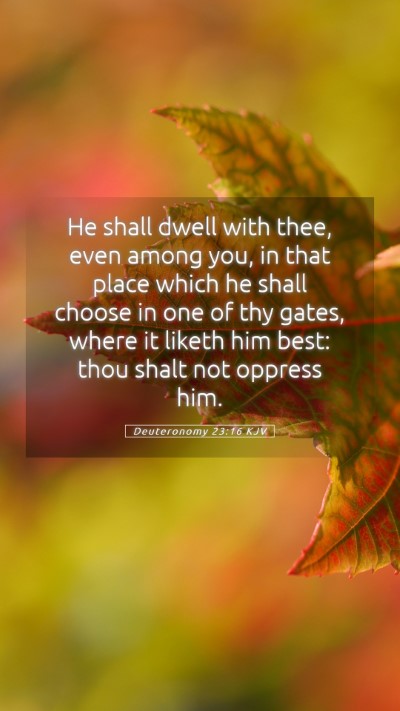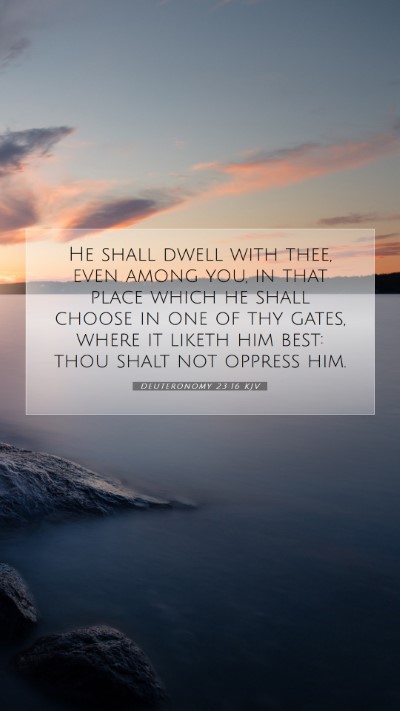Bible Verse Explanation: Deuteronomy 23:16
Verse Text: "He shall dwell with you, even among you, in that place which he shall choose in one of your gates, where it liketh him best: you shall not oppress him." (Deuteronomy 23:16)
Overview: Deuteronomy 23:16 addresses the treatment of escaped servants or slaves who seek refuge among the Israelites. This verse emphasizes the importance of compassion and acceptance, prohibiting oppression against these individuals and highlighting the broader biblical theme of mercy and justice.
Meaning and Interpretation
-
Compassion Towards the Vulnerable: Matthew Henry's Commentary
This verse calls for compassion and protection towards those marginalized in society. It serves as a reminder of the covenant community's duty to provide sanctuary to those in need, reflecting God's own mercy.
-
Acceptance and Inclusion: Albert Barnes' Notes on the Bible
Barnes interprets the command as granting the escaped servant equal rights and protection as any Israelite. They should not be treated with disdain or viewed as less than human, emphasizing equality and justice.
-
The Right to Choose Quality of Life: Adam Clarke’s Commentary
Clarke notes that the escaped individual is given the autonomy to choose their dwelling. This not only recognizes their humanity but also precludes any oppressive behaviors from the Israelites towards those in distress.
Historical Context
This command is situated within the broader laws given to the Israelites as they prepared to enter the Promised Land. Understanding the historical context sheds light on the expectations of the Israelite community and their social responsibilities.
Significance in Scripture
Deuteronomy 23:16 contributes to the larger narrative regarding the ethical treatment of others, including the vulnerable and disenfranchised. It resonates with the themes found throughout Scripture concerning justice, mercy, and human dignity.
Cross References
- Exodus 21:16 - Discusses the consequences for those who kidnap and oppress.
- Leviticus 19:33-34 - Stresses the importance of loving the stranger as oneself.
- Matthew 25:35 - Connects to the New Testament's message of caring for the needy.
Application of the Verse
In a practical sense, Deuteronomy 23:16 invites believers to reflect on their own attitudes and behaviors towards marginalized individuals in society. The call for compassion and non-oppression is applicable in various contexts such as social justice, community service, and personal interactions.
Conclusion
Understanding Deuteronomy 23:16 requires examining its moral and ethical implications as it pertains to societal treatment of those seeking refuge. The commentary from Matthew Henry, Albert Barnes, and Adam Clarke collectively reinforce the need for kindness and justice, underscoring foundational biblical principles that remain relevant today.
Further Study Recommendations
For those interested in deeper study, consider exploring:
- Bible Study Guides: Tools that facilitate thorough exploration of scripture.
- Online Bible Study Courses: Interactive courses focusing on biblical teachings and applications.
- Historical Context Resources: Materials that provide insight into the times and cultures of the Bible.


